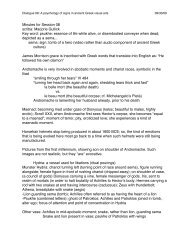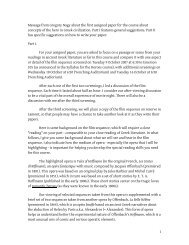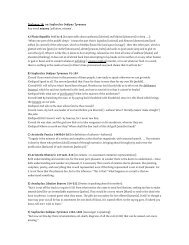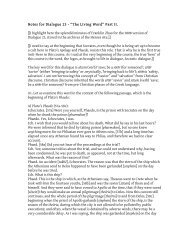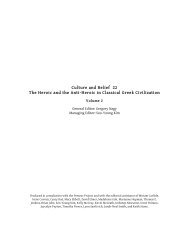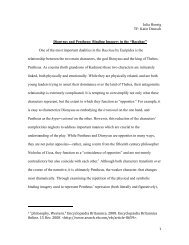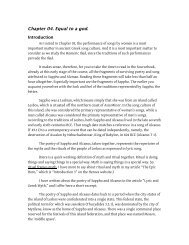Create successful ePaper yourself
Turn your PDF publications into a flip-book with our unique Google optimized e-Paper software.
<strong>Chapter</strong> <strong>11</strong><br />
Key word for this dialogue: olbios ‘blessed’ (for the initiated) and ‘prosperous, happy’<br />
(for the uninitiated). The cult hero is olbios ‘blessed’ after he or she dies. The<br />
worshipper of a hero becomes olbios ‘blessed’ by making contact with the hero.<br />
Most relevant is a word we have considered at length already, sēma. In Passage A, note<br />
the sēma of Achilles, which looks out over the Hellespont.<br />
In Passage A, we see a retrospective glance at the Iliad - in the Odyssey.<br />
A) Odyssey xxiv 35-97: "Happy [olbios] son of Peleus," answered the ghost [psukhē] of<br />
Agamemnon, "for having died at Troy far from Argos, while the bravest of the Trojans<br />
and the Achaeans fell round you fighting for your body. There you lay in the whirling<br />
clouds of dust, all huge and hugely, heedless now of your chariot-riding. ... Then, when<br />
we had borne you to the ships out of the fray, we laid you on your bed and cleansed<br />
your fair skin with warm water and with ointments. The Danaans tore their hair and<br />
wept bitterly round about you. Your mother, when she heard, came with her immortal<br />
nymphs from out of the sea, and the sound of a great wailing went forth over the<br />
waters so that the Achaeans quaked for fear. ...The daughters of the old man of the sea<br />
stood round you weeping bitterly, and clothed you in immortal raiment. The nine<br />
muses also came and lifted up their sweet voices in lament—calling and answering one<br />
another; there was not an Argive but wept for pity of the dirge they chanted. Days and<br />
nights seven and ten we mourned you, mortals and immortals, but on the eighteenth<br />
day we gave you to the flames, and many a fat sheep with many an ox did we slay in<br />
sacrifice around you. You were burnt in raiment of the gods, with rich resins and with<br />
honey, while heroes—horse and foot—clashed their armor round the pile as you were<br />
burning, with the tramp as of a great multitude. But when the flames of heaven had<br />
done their work, we gathered your white bones at daybreak and laid them in ointments<br />
and in pure wine. Your mother brought us a golden vase to hold them—gift of Dionysos,<br />
and work of Hephaistos himself; in this we mingled your bleached bones with those of<br />
Patroklos who had gone before you, and separate we enclosed also those of Antilokhos,<br />
who had been closer to you than any other of your comrades now that Patroklos was no<br />
more. [80] Over these the host of the Argives built a noble tomb [tumbos] on a point<br />
jutting out over the open Hellespont, that it might be seen from far out upon the sea by<br />
those now living and by them that shall be born hereafter. Your mother begged prizes<br />
from the gods, and offered them to be contended for in a contest [agōn] of the noblest<br />
of the Achaeans. You must have been present at the funeral of many a hero, when the<br />
young men gird themselves and make ready to contend for prizes on the death of some<br />
great chieftain, but you never saw such prizes as silver-footed Thetis offered in your<br />
honor; for the gods loved you well. Thus even in death your kleos, Achilles, has not been<br />
lost, and your name lives evermore among all mankind. But as for me, what solace had I<br />
when the days of my fighting were done? For Zeus willed my destruction on my return<br />
[nostos], by the hands of Aegisthus and those of my wicked wife."<br />
I note in this passage the portrayal of Achilles as a beau mort.
For a Modern Greek parallel, compare this poem by Ritsos, which was set to music by<br />
Theodorakis, reworked by Hadzidakis<br />
(translation by George Syrimis)<br />
mallià zgourà pou pàno tous ta dhàhtila pernoùsa<br />
tis nìhtes pou kimòsouna ke plài sou xagripnoùsa<br />
frìdhi mou gaitanòfridho ke kontilogramèno<br />
kàmara pou to vlèma mou koùrniaze anapamèno<br />
màtia glarà pou mèsa tous antìfengan ta màkri<br />
proinoù ouranoù ke pàskhiza min ta thambòsi dhàkri<br />
hìli mou moskomìristo pou os làlages anthìzan<br />
lithària ke xeròdhendra ki aidhònia fterougìzan<br />
Curly hair through which my fingers I would pass,<br />
the nights you slept and next to you I kept vigil<br />
That eyebrow for me, sword-curved eyebrow and pencil-drawn<br />
- an arch in which my gaze would nest in peace.<br />
Blue eyes in which would shine the distances<br />
of a morning sky, and I toiled that they would not be blurred by tears.<br />
Those sweet-smelling lips for me, when you spoke there was blossoming<br />
of stones and dried out trees, and nightingales would flutter.<br />
In Passage B, we see a prospective glance at epic beyond our Odyssey - in the Odyssey.<br />
B) Odyssey xi 90-137: Then came also the ghost [psukhē] of Theban Teiresias, with his<br />
golden scepter in his hand. He knew me and said, 'Odysseus, noble son of Laertes, why,<br />
poor man, have you left the light of day and come down to visit the dead in this sad<br />
place? Stand back from the trench and withdraw your sword that I may drink of the<br />
blood and answer your questions truly.' [97] So I drew back, and sheathed my sword,<br />
whereon when he had drank of the blood he began with his prophecy [= words of a<br />
mantis]. [100] 'You want to know,' said he, 'about your return home [nostos], but the<br />
gods will make this hard for you. I do not think that you will escape the eye of<br />
Poseidon, who still nurses his bitter grudge against you for having blinded his son. Still,<br />
after much suffering you may get home if you can restrain yourself and your<br />
companions when your ship reaches the Thrinacian island, where you will find the<br />
sheep and cattle belonging to the sun, who sees and gives ear to everything. If you<br />
leave these flocks unharmed and think of nothing but of getting home [nostos], you may<br />
yet after much hardship reach Ithaca; but if you harm them, then I forewarn you of the<br />
destruction both of your ship and of your men. Even though you may yourself escape,<br />
you will return in bad plight after losing all your men, in another man's ship, and you<br />
will find trouble in your house, which will be overrun by high-handed people, who are<br />
devouring your substance under the pretext of paying court and making presents to<br />
your wife. [<strong>11</strong>8] When you get home you will take your revenge on these suitors; and<br />
after you have killed them by force [biē] or fraud in your own house, you must take a<br />
well-made oar and carry it on and on, till you come to a country where the people have
never heard of the sea and do not even mix salt with their food, nor do they know<br />
anything about ships, and oars that are as the wings of a ship. I will give you this<br />
certain token [sēma] which cannot escape your notice. A wayfarer will meet you and<br />
will say it must be a winnowing shovel that you have got upon your shoulder; on this<br />
you must fix the oar in the ground and sacrifice a ram, a bull, and a boar to Poseidon.<br />
Then go home and offer hecatombs to the gods in the sky one after the other. As for<br />
yourself, death shall come to you from the sea, and your life shall ebb away very gently<br />
when you are full of years and peace of mind, and your people shall be prosperous<br />
[olbioi]. All that I have said will come true.'<br />
We see here a prophecy of the sēma of Odysseus. His body will make his worshippers<br />
olbioi because he will be olbios in death.<br />
We have just seen in what we have read a “crisis” in “reading.” The word crisis is<br />
derived from...<br />
krisis 'judgment, crisis', abstract noun derived from krinesthai 'judge, distinguish, make<br />
distinctions'; hupo-krinesthai is the way for a seer to answer a question about a<br />
vision seen by someone else, as in the case of Penelope's dream.<br />
kritērion = criterion for judging, distinguishing, making distinctions<br />
kritikos 'critical' (in both senses: 'crisis-related' or 'criticism-related')<br />
Consider again Odyssey i 1-10: That man, tell me about him, O Muse, about that manysided<br />
man who wandered far and wide after he had sacked the famous town of Troy.<br />
Many cities did he visit, and many were the people with whose customs and thinking<br />
[noos] he was acquainted; many pains [algea] he suffered at sea while seeking to save his<br />
own life [psukhē] and to achieve the safe homecoming [nostos] of his companions; but do<br />
what he might he could not save his men, for they perished through their own sheer<br />
recklessness in eating the cattle of the Sun-god Helios; so the god prevented them from<br />
ever reaching home. Tell me, as you have told those who came before me, about all<br />
these things, O daughter of Zeus, starting from whatsoever point you choose."<br />
Odyssey i 3 Odysseus saw the cities of many and came to know their/his noos<br />
Odyssey i 5 Odysseus seeking to win as a prize his psukhē, plus [his nostos and] the nostos<br />
of his companions<br />
noos of Teiresias at Odyssey xi 493-495 / nostos is first word of Teiresias at Odyssey xi 100<br />
Compare Odyssey xi 121-137 with the different version in Odyssey xxiii 267-268: there it<br />
is made explicit that Odysseus is to travel through the cities of humankind. The<br />
"journey of a soul" through many different cultures, with different values, is key<br />
to noos.<br />
Compare Odyssey i 3: Odysseus, by virtue of traveling throughout the cities of<br />
humankind, comes to "know" noos. The question remains: whose noos?<br />
Odyssey xi 126 'I will give you this certain token [sēma], and you cannot have lēthē about<br />
it'.
Compare the clip from Kurosawa's Dreams in the film archive, "A gravestone marker for<br />
a journey of the soul."<br />
'winnowing-shovel' at Odyssey xi 128; it is a mistake to translate as 'winnowing-fan'; a<br />
winnowing shovel looks just like an oar, but a winnowing-fan does not.<br />
C) Two variant tales, collected by folklorists in early-20th-century Greece and analyzed<br />
by William F. Hansen, about St. Elias [known as the Prophet Elijah in the Hebrew bible]:<br />
Variant 1[a]: Saint Elias was a seaman who lived a dissolute life, but he repented<br />
of what he had done and thereby detested the sea. {Variant 1[b]: because he had<br />
suffered much at sea and had often nearly drowned, he became disgusted with<br />
voyaging.} He resolved to go to a place where people know neither what the sea was<br />
nor what ships were. Putting his oar on his shoulder he set out on land, asking<br />
everyone he met what he was carrying. So long as they answered that it was an oar, he<br />
proceeded to higher and higher ground. Finally, at the top of a mountain he asked his<br />
question, and the people answered, 'a stick'. Understanding then that they had never<br />
seen an oar, he remained there with them.<br />
Variant 2: The Prophet Elias was a fisherman who, because of terrible weather<br />
and terrific storms, became afraid of the sea. So he put an oar on his shoulder and took<br />
to the hills. When he met a man, he asked him what it was he was carrying; the man<br />
answered that it was an oar, and Elias went on. The same happened when he met a<br />
second man. But at the top of a mountain, he asked a third man, who replied, 'why,<br />
that's a stick'. Saint Elias resolved to stay there. He planted his oar in the ground, and<br />
that is why his chapels are all built on hilltops.<br />
Variant 3: In some versions, the natives' decisive answer is not 'a stick' but 'a<br />
baker's peel' [phtyari tou phournou = "winnowing-shovel of the oven"].<br />
Feast Day of the Prophet Elias: July 20. This date coincides, roughly, with harvesting<br />
season. It is around this time when wheat is gathered and winnowed.<br />
There is a hero cult of Odysseus in Arcadia, where he is worshipped together with<br />
Athena as goddess of pilots and Poseidon as god of the sea (Pausanias 8.44.4); note that<br />
Arcadia is mountainous and landlocked. Of all locales in mainland Greece, it is farthest<br />
away from the sea.<br />
Planting of winnowing-shovel on top of a mound of winnowed grain (Theocritus<br />
7.155ff): a symbolic gesture, meaning "the harvest is accomplished = finished."<br />
Tomb of Elpenor: Odyssey xi 75-78, xii 13-15. This sēma 'tomb' is also a 'sign, signal,<br />
symbol' meaning "the sailor is dead."<br />
D) Odyssey xix 106-<strong>11</strong>4: "Lady," answered Odysseus, "who on the face of the whole earth<br />
can dare to chide with you? Your fame [kleos] reaches the firmament of heaven itself;<br />
you are like some blameless king, who upholds righteousness [= good dikē], as the<br />
monarch over a great and valiant nation: the earth yields its wheat and barley, the<br />
trees are loaded with fruit, the ewes bring forth lambs, and the sea abounds with fish by<br />
reason of his virtues, and his people do good deeds under him.
This word dikē means 'justice' (long-range) and 'judgment' (short-range). The sign of<br />
dikē is a thriving or blooming field / garden / orchard / grove / vineyard / etc.<br />
Supplemental passages and notes<br />
E) Aristotle Poetics 1452a29ff, discussing "recognition scenes" in e.g. tragedy:<br />
"Recognition [ana-gnō-risis] is ... a change from ignorance to knowledge [gnō-sis],<br />
tending either to affection [philia] or to enmity; it determines in the direction of good<br />
or ill fortune the fates of the people involved" (tr. Margaret Hubbard).<br />
F) From Odyssey xix 535-569: “Listen, then, to a dream that I have had and interpret it [=<br />
make a hupo-krisis of it] for me if you can. I have twenty geese about the house that eat<br />
mash out of a trough, and of which I am exceedingly fond. I dreamed that a great eagle<br />
came swooping down from a mountain, and dug his curved beak into the neck of each<br />
of them till he had killed them all. Presently he soared off into the sky, and left them<br />
lying dead about the yard; whereon I wept in my room till all my maids gathered round<br />
me, so piteously was I grieving because the eagle had killed my geese. Then he came<br />
back again, and perching on a projecting rafter spoke to me with human voice, and told<br />
me to leave off crying. ‘Be of good courage,’ he said, ‘daughter of Ikarios; this is no<br />
dream, but a vision of good omen that shall surely come to pass. The geese are the<br />
suitors, and I am no longer an eagle, but your own husband, who am come back to you,<br />
and who will bring these suitors to a disgraceful end.’ On this I woke, and when I looked<br />
out I saw my geese at the trough eating their mash as usual.” [554] “This dream, lady,”<br />
replied Odysseus, “can admit but of one interpretation [hupo-krisis], for had not<br />
Odysseus himself told you how it shall be fulfilled? The death of the suitors is<br />
portended, and not one single one of them will escape.” [559] And Penelope answered,<br />
“Stranger, dreams are very curious and unaccountable things, and they do not by any<br />
means invariably come true. There are two gates through which these unsubstantial<br />
fancies proceed; the one is of horn, and the other ivory. Those that come through the<br />
gate of ivory are fatuous, but those from the gate of horn mean something to those that<br />
see them. I do not think, however, that my own dream came through the gate of horn,<br />
though I and my son should be most thankful if it proves to have done so."<br />
Here I invoke again the key word krisis.<br />
Again we see a crisis in reading... krisis 'judgment, crisis', abstract noun derived from<br />
krinesthai 'judge, distinguish, make distinctions'. A hupo-krisis (verb hupo-krinesthai) is an<br />
answer to a question that generates such a krisis.<br />
After Odysseus achieves a physical nostos by literally coming home to Ithaca, he still<br />
needs to achieve a mental / moral / emotional nostos, For this to happen, the characters<br />
in the second half of the Odyssey have to connect with him on various levels. The key to<br />
this "connection" is the hero's ascending scale of affection.<br />
The characters involved in the hero's ascending scale of affection include: his dog; his<br />
loyal servants, like Eumaios and Eurykleia; his son; his wife; his father. All these
characters have to "read" the disguised Odysseus in order to recognize him. Correlated<br />
with recognition is philia.<br />
A primary form of philia: the relationship between lovers.<br />
The challenge of "reading" Odysseus is the challenge of "reading" the ulterior motives<br />
of his ainoi. The ainoi that Odysseus intends for Penelope are a kind of "love song."<br />
Compare "Cherubino's devinalh" in Mozart's The Marriage of Figaro. {LINK}<br />
From Le nozze di Figaro, by Wolfgang Amadeus Mozart (libretto by Lorenzo Da Ponte)<br />
"Cherubino's song":<br />
voi che sapete che cosa è amor,<br />
donne vedete s'io l'ho nel cor!<br />
quello ch'io provo, vi ridirò:<br />
è per me nuovo, capir nol so!<br />
sento un affetto pien de desir,<br />
ch'ora è diletto, ch'ora è martir,<br />
gelo e poi sento l'alma vampar,<br />
e in un momento torno a gelar.<br />
ricerco un bene fuori di me,<br />
no so chi il tiene, o so cos' è;<br />
sospiro e gemo senza voler,<br />
palpito e fremo senza saper;<br />
non trovo pace notte né di<br />
ma pur mi piace languir così!<br />
voi che sapete...<br />
You, who know what thing love is...<br />
My ladies, see if I have it in my heart.<br />
That thing that I experience, to you I will retell.<br />
It's new to me, I don't know how to grasp it.<br />
I feel a longing full of desire,<br />
which is at one moment delight, another moment, pain.<br />
I freeze, and then I sense the soul bursting into flame.<br />
And, the next second, I turn back to freezing.<br />
I search for a good thing outside of me.<br />
I don't know who holds it, or have any idea what it is.<br />
I sigh and moan without wanting to,<br />
I throb and tremble without knowing,<br />
I don't find any peace, night or day.<br />
But still it gives me pleasure to languish this way.<br />
You, who know what thing love is..<br />
In Cherubino’s song, Mozart is using a form of troubadour songmaking called the<br />
devinalh. It is meant to be understood only by the addressee / beloved of the singer /<br />
lover.<br />
The devinalh is parallel to the ainos. Let us review the definition of ainos in the glossary:<br />
'authoritative utterance for and by a social group; praise; fable'; ainigma 'riddle'<br />
a. 'praise' as in the victory-songs of Pindar<br />
b. 'fable' as in the Fables of Aesop<br />
c. 'riddle' as in the Riddle of the Sphinx, a key symbol in the Oedipus Tyrannos of<br />
Sophocles, which we will read later on.<br />
Review from earlier dialogues... One of the clearest examples of ainos is the klea andrōn<br />
of Iliad IX 524, referring to the narrative that is "totally recalled" by Phoenix for<br />
Achilles and the other assembled philoi. The ainos here is signaled by what<br />
anthropologists call an "index" word (houtō 'thus' at Iliad IX 524). An example of an<br />
"index" expression in English: "once upon a time..."<br />
Review the prerequisites of ainos:<br />
a. sophos (plural sophoi) 'skilled, skilled in understanding special language'<br />
b. agathos (plural agathoi) 'good, noble'
c. philos (plural philoi) 'friend' (noun); 'dear, near-and-dear, belonging to self' (adjective)<br />
= 3 qualifications (1 intellectual, 2 moral, 3 emotional) required for understanding ainos<br />
in e.g. the poetics of Pindar (his medium calls itself ainos)<br />
Reminder: ainos is to audio as sēma is to video.<br />
As a code, the ainos (or sēma) can have hidden agenda.<br />
It can be a secret password for initiation into mysteries, for example.<br />
The "secret password" can take the form of a song.<br />
Odyssey xiv 508: Eumaios compliments the speech of the disguised Odysseus by calling it<br />
an ainos<br />
The ainos is one code, with several messages built in, only one of which is ultimately<br />
true; compare the English expression ulterior motive<br />
anagignōskein 'recognize; read'<br />
Compare again Aristotle Poetics 1452a29ff, discussing "recognition scenes" in e.g.<br />
tragedy (his criteria apply to epic as well): "Recognition [ana-gnō-risis] is ... a change<br />
from ignorance to knowledge [gnō-sis], tending either to affection [philia] or to enmity;<br />
it determines in the direction of good or ill fortune the fates of the people involved" (tr.<br />
Margaret Hubbard)<br />
The "love story" of Odysseus and Penelope, which preoccupies the second half of the<br />
Odyssey, can only be understood in terms of the process of their mutual recognition.<br />
Reassembly of identity via reassembly of ascending scale of affections (the persons with<br />
whom you identify will ultimately identify you).<br />
Why all the difficulty of recognizing wife and father?<br />
Cave of Polyphemos (think of the meaning of the name), where Odysseus negates his<br />
identity: nostos from the cave will be the key to noos



